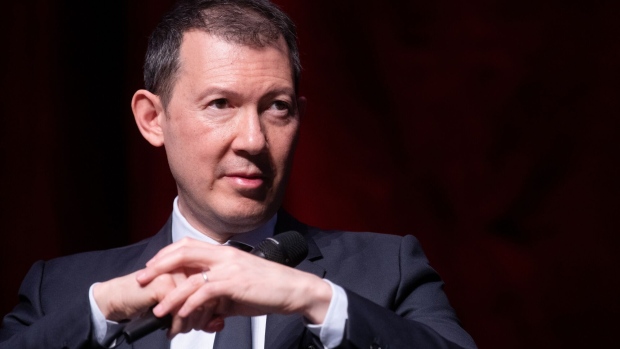Sep 25, 2023
Air France-KLM to Place Order for 50 A350 to Renew Long-Haul Fleet
, Bloomberg News

(Bloomberg) -- Air France-KLM said the decision to go with Airbus SE for its widebody fleet renewal came down to a complex choice around aircraft range, pricing and slot availability — and the European planemaker’s willingness to be more aggressive to edge out arch-rival Boeing Co.
The Franco-Dutch airline group announced the purchase of 50 A350 widebody aircraft in a yet undefined mix of the -900 and the larger -1000 variant, according to a statement late on Monday. For seven months, the company had negotiated with both manufacturers as it sought to replace older models in its long-range fleet.
“We were negotiating until the last minute,” Air France-KLM Chief Executive Officer Ben Smith told reporters on Monday. “And it wasn’t that straightforward because at Air France, we have both A350s and the 787 in the fleet today. So it could have gone either way.”
The order was among the most hotly contested this year as Airbus seeks to build momentum with its most advanced jet while Boeing still works to get its largest model, the 777X, to customers. The US manufacturer didn’t end the day entirely empty-handed, though, announcing a deal earlier on Monday with Air Canada for 18 787-10 Dreamliner models to replace older planes.
One consideration on Air France-KLM’s mind was range, particularly the challenge of flying around the huge Russian air space, which Smith said will likely remain shut for some time.
And as demand for long-distance travel comes back, slots are proving increasingly constrained to place wide-body deals. Ultimately, Airbus was able to guarantee deliveries that Air France-KLM needed — running from 2026 to 2030 — that were superlative to what Boeing could do, Smith said.
“So overall, when you look at price and you look at availability, you look at the range capability and you put that in together, that’s what the mixture of all that is what drove us to selecting the A350 as as our choice.”
The winner-takes-all vote is somewhat unusual for the Franco-Dutch airline group, which has historically favored a more mixed fleet between the two manufacturers. The Airbus purchase, should Air France-KLM also exercise options to buy an additional 40 units, will make the company the biggest operator of Airbus’s A350 family.
Air France-KLM has also had historically strong ties with engine manufacturers General Electric Co. and Safran SA, neither of which are an option on the Airbus model. That plane comes only with Rolls-Royce Group Plc engines, which posed a challenge to Air France-KLM because of what Smith called the “very, very deep relationship” with GE for its other long-range jets.
“Airbus had to be much more aggressive to offset that along with Rolls-Royce,” Smith said.
Earlier this month, Air France-KLM and Airbus announced plans for a maintenance joint venture for the Airbus A350 aircraft, giving Airbus some leverage in its talks with the Franco-Dutch group.
Air France-KLM called the purchase an “evolutionary order” that gives the group a choice on aircraft allocation within its portfolio of airlines based on market dynamics and local regulatory conditions. While the deal is for Air France and KLM replacements, the company wanted “full flexibility” to decide where the new planes go, it said.
Air France-KLM also aims to participate in consolidation, and “there’s no reason why these airplanes couldn’t form part of an investment or some consolidation effort that we make,” said the CEO, who renewed his interest in Portuguese flag carrier TAP SA.
“We’re getting ourselves ready for a bid,” Smith said. “We just want to hit the road running if and when the process starts.”
©2023 Bloomberg L.P.


